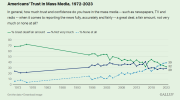Further proof that Trump didn't start a riot on Jan 6th. No one needed Trump to tell them what they already believed.
Legally, he probably does not bear responsibility for the riot, he has always been a master of plausible deniability ("I said peacefully and patriotically!"). He is also a master at talking out of both sides of his mouth, telling one side what he wants them to here, while also throwing in other conflicting statements to create said deniability. The "very fine people on both sides" comment, which you also describe as a hoax, is a good example, as is, "Stand back and stand by."
But morally, he absolutely bears responsibility. The only reason his followers suspected shenanigans is because he told them he was cheated, over and over and over. To my earlier point about agreement on what is true, there is absolutely no evidence that anything untoward went down. If there had been evidence, it would have been presented. The best he could come up with was procedural stuff (changes in voting process without state legislative approval), which went down in both red states and blue states because of COVID. These challenges were generally thrown out because they were not raised in a timely manner (objections were made after results tallied, even though procedures were put into place months prior) and the remedies requested were extreme and unconstitutional (throwing out the votes from entire precincts, generally from large, urban areas).
So, he lied about the election being rigged, he invited people to DC for a "wild" rally, he told them to march down the capitol to protest, and he primed them by telling them "if you don't fight like Hell, you're not going to have a country anymore"...while out of the other side of his mouth saying "peacefully and patriotically" somewhere along the way for plausible deniability.
Then, when they started rioting, he stoked the situation by refusing to condemn it immediately. Even after he knew windows were being kicked in, explosions were reported on the Capitol steps, and Capitol Police were being assaulted, he sent his "
Mike Pence didn't have the courage" tweet that escalated matters. He sent another 15 minutes later that included "stay peaceful!" and another 35 minutes after that with "...remain peaceful. No violence!". Again, he is good at the plausible deniability thing. When he finally released a
video message over and hour later, he repeated the lies about the election being stolen and the other side being "so bad and so evil" while asking his supporters to go home in peace (again, talking out of both sides of his mouth). While he was recording this, some of the most intense skirmishes were still taking place at the Capitol.
None of the information above is in dispute, these are matters of fact (my interpretation of Trump talking out of both sides of his mouth is, of course, my opinion). At no point on this day did Trump live up to the moral expectations of his office, whether he is legally liable or not.
I am sure you will respond with, "But
Ray Epps!" While there is no hard evidence for this conspiracy theory, even if we assumed it was true, it would not exculpt Trump in any way from his actions. So please, if you reply, focus on why you believe Trump's actions on that day were appropriate for the office of the President, not anything related to a conspiracy theory that FBI agents instigated the riot.

